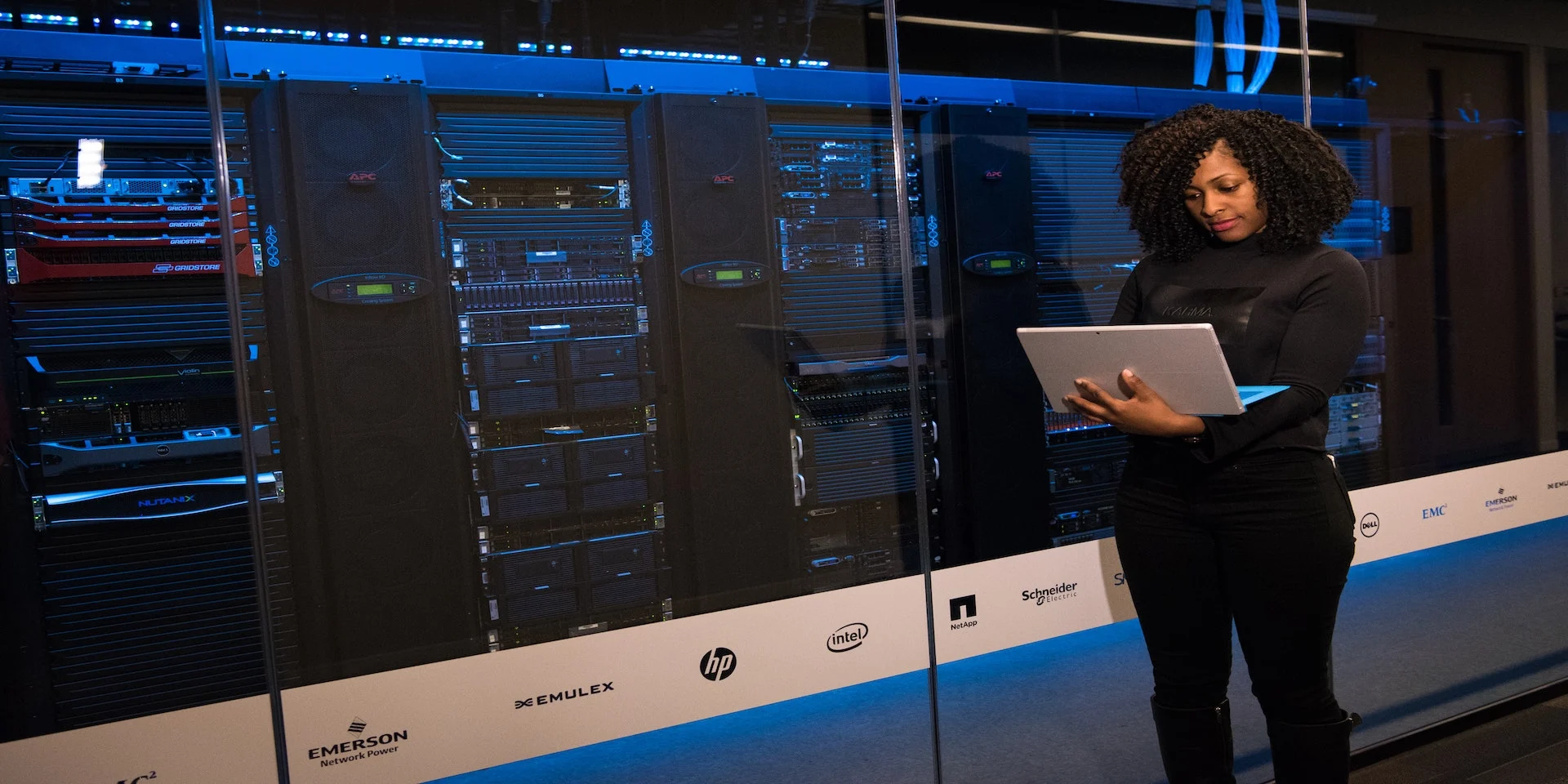In this guide, we’ll explore some of the best IT careers for you, including the qualifications, skills, and certifications needed to succeed.
Why Pursue an IT Career?
The tech industry is booming, and IT careers are in high demand. From system administrators to cybersecurity experts, the opportunities are vast. In fact, according to the U.S. Bureau of Labor Statistics, 56,700 IT openings are projected each year from 2023 to 2033, much faster than the average for other professions. This makes now the perfect time to consider a career in IT.
However, it should be noted that when you work in information technology (IT), most positions require the same fundamental, technical understanding of the computer systems that are generally used in organizations, regardless of industry. Each role differs in its area of specialization and the type of soft skills required undertake day-to-day duties.
IT Roles Overview
Here’s a quick summary of different IT roles you can apply for after IT vocational training.
1. Network Administrator
- What They Do: Network administrators are responsible for managing and maintaining computer networks within an organization, ensuring systems run smoothly and securely.
- Skills Needed: Networking protocols, hardware knowledge, troubleshooting, security, and cloud technologies.
- Key Certifications: CompTIA Network+, CompTIA Security+, Cisco Certified Network Associate (CCNA).
- Average Salary: $98,600 per year.
2. Computer Support Specialist
- What They Do: Computer or IT support specialists provide technical assistance and troubleshooting for end-users, solving hardware and software issues.
- Skills Needed: Problem-solving, customer service, basic networking, and knowledge of operating systems.
- Key Certifications: CompTIA A+
- Average Salary: $61,500 per year.
3. Cloud Administrator
- What They Do: Cloud admins manage cloud computing infrastructure, ensuring businesses can efficiently use remote servers for storage, applications, and computing resources.
- Skills Needed: CompTIA Network+, Cloud platforms (AWS, Microsoft Azure), virtualization, networking, and cloud security.
- Key Certifications: AWS Certified Solutions Architect, Microsoft Certified: Azure Solutions Architect Expert.
- Average Salary: $108,000 per year.
NOTE: You can also aim for cybersecurity roles. However, cybersecurity fundamentals are covered in both network and cloud computing training.
How to Choose Which IT Role is Best For You?
Here are a few questions you can ask yourself to determine which role would suit you best.
Do You Prefer Working with People or Machines?
All three positions in IT, Computer User Support Technicians, Network Support Specialists, and Systems Administrators, require similar technical skills, but they differ in how those skills are applied on the job.
- Computer Support Technicians focus primarily on helping individuals with the devices they use to connect to the organization’s network.
- Network Support Specialists and Systems Administrators, on the other hand, manage the organization’s entire network infrastructure.
If you enjoy working with electronics and prefer technical tasks over interacting with people, a network role might be a better fit for you.
Network positions tend to involve more behind-the-scenes work with hardware and systems. In contrast, User Support Technicians focus on assisting people directly, which involves communication and problem-solving.
Job Hours can also differ between these roles. If you’re looking for a more standard 9-5 schedule, Network Administrators generally work more regular hours. However, Support Technician roles may require occasional evening or weekend shifts, depending on the company’s needs.
Can You Communicate Instructions Clearly and Effectively?
When supporting computer systems, it’s important to communicate clearly with co-workers, management, and clients, each of whom may have different levels of technical knowledge. However, not all IT roles demand the same communication skills, allowing you to pick a career that suits your style.
- Computer Support Specialists often work with people who have little to no technical knowledge. You’ll need to explain things simply and provide step-by-step instructions in a patient, friendly manner. For example, you might often find yourself saying, “Have you tried turning it off and then on again?” and guiding users through basic troubleshooting steps.
- If you’re not comfortable explaining things to non-technical people, Network Support Specialist roles might be a better fit. Here, you’ll mostly communicate with other IT professionals who already have a basic understanding of networking concepts.
- As a Network Administrator, you’ll communicate between the IT department and management. While explaining technical systems to non-IT staff isn’t common, you will often need to present your work and its benefits to those outside the technical team.
Effective communication, especially patience and empathy, is a key skill for all IT roles, but it’s especially crucial in user-facing positions like Computer Support.
What Type Of Problems Do You Like To Solve?
Problem-solving and critical thinking are essential skills for all three positions, but it is the type of problems that need to be solved that differ.
- Computer User and Network Support roles solve problems as they occur, and take steps to prevent them from occurring in the future.
- Network Administrators need to use their logic to determine all the possible problems that could occur within the computer network and consider solutions for both within the network and amongst users.
Planners who like to prepare for every little possibility in life will find that Network Administrator positions fulfill that ability to think through the entire project and come up with solutions to any foreseeable problems. Those who are much more likely to figure out problems as they go will find they like the fast-paced user and network support roles.
Do You Enjoy Teaching Others?
If you enjoy teaching or have patience for explaining things, a support role may be the right fit for you. Computer Support Technicians and Network Support Specialists are often responsible for educating users and helping them solve issues while preventing future problems. For example, you might need to explain basic security practices to users who are unfamiliar with IT, such as recognizing phishing emails.
While Network Administrators might occasionally need to explain their systems to management or IT staff, their role typically doesn’t require educating non-technical employees. The support team often handles user training, which is vital for maintaining security and efficiency across the organization.
Being a good teacher means being able to break down complex concepts into easy-to-understand instructions, without making others feel inferior. This is a valuable skill in User Support and Network Support roles, where helping others learn is a big part of the job.
Are You More Interested in Computers or the Systems That Power Them?
The focus of your role will depend on whether you prefer working with individual computers or managing entire systems.
- Computer Support focuses on helping users with their individual devices and ensuring their systems are secure and functioning properly. A strong understanding of operating systems, such as Microsoft Windows and Linux, is essential, as well as knowledge of security protocols and the hardware that runs them.
- Network Support Technicians maintain and troubleshoot the overall network infrastructure. They ensure that all systems, servers, and devices are connected and functioning properly, enabling users to access the network without issues.
- Systems Administrators design, implement, and maintain the organization’s entire network and telecommunications systems. While they also need to understand operating systems and software, their primary focus is on managing the network infrastructure, servers, and hardware that power the organization’s IT systems.
If you’re more interested in the individual devices that users interact with, a role in User Support may be best for you. But if you prefer focusing on the larger systems that make the entire network run, Network Support or Systems Administration might be the way to go.
Where Do You Fall?
Now that the answers to the questions above have been explained, you may have a much better idea of which category of IT program you fall under.
If you’re still unsure which IT role is ideal for you? Take our quiz to help you choose the right trade.
The question then becomes, where to start? CCI Training Center has expert staff that can help you find the certifications that will allow you to confidently go out and procure the position of your choice in the IT industry.
Our classes are offered on a year-round schedule with many different options of days of the week for your convenience. CCI knows that our adult students do not have the luxury of ceasing to work at their current vocation while training for their new IT career. That’s why we’ve made our class schedules as flexible as possible.













